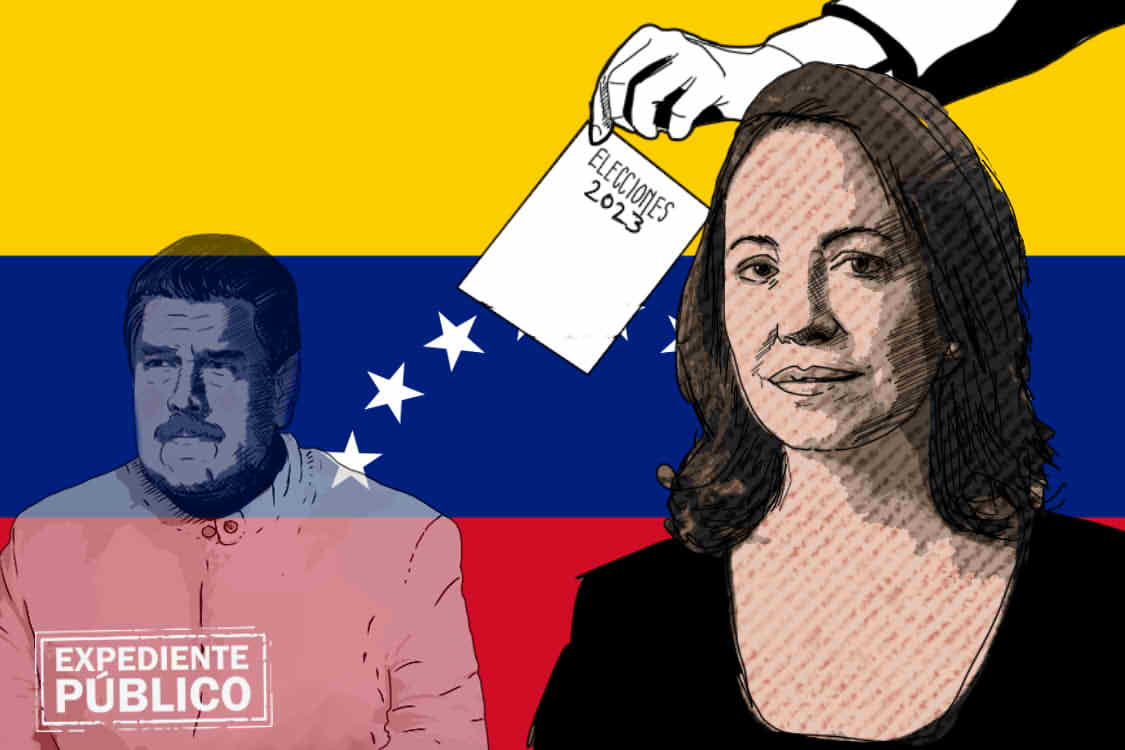*The favorite to win the primaries in Venezuela is María Corina Machado, who is blocked from presidential candidacy.
**This October 22, it is estimated that up to three million Venezuelans within and outside the country may vote.
***With the easing of US sanctions, the Nicolás Maduro regime will try to heighten the divisions among its adversaries and develop a clientelist campaign.
Expediente Público
On October 6, 2023, the current president of the National Electoral Council (CNE), Elvis Huidobro Amoroso, spoke by telephone with the main representative of the opposition National Primary Commission (CNP), Jesús María Casal, to update him on the Nicolás Maduro regime’s latest gambit.
By that time, relations between the two organizations appeared to have definitively ruptured. The public powers, entirely aligned with the ruling party, were laying the groundwork for a de facto suspension of the opposition event.
Some days earlier, the Supreme Court of Justice had issued a ruling in which it allocated the “exclusive” power over the organization of any election, be it a presidential election or a union election, to the Electoral Branch.
Chavismo tried to block primaries
It seemed that the primary’s days were numbered. And this was repeated by the vice president of the United Socialist Party of Venezuela, Diosdado Cabello, every time he touched on the topic in his weekly program broadcast on the state-run Venezuelan Television.
“There will be no primary here,” he said in February. “There is no primary anymore.” “I was called and I was told: we are all going to leave because they are going to put us in prison,” he repeated in September.
See: Chavismo intends to do away with Venezuela’s opposition primaries
But, to Casal‘s surprise and that of the other principal members of the commission, Amoroso notified him of the regime’s decision to accept all the conditions demanded by the CNP to accept technical assistance from the Electoral Branch.
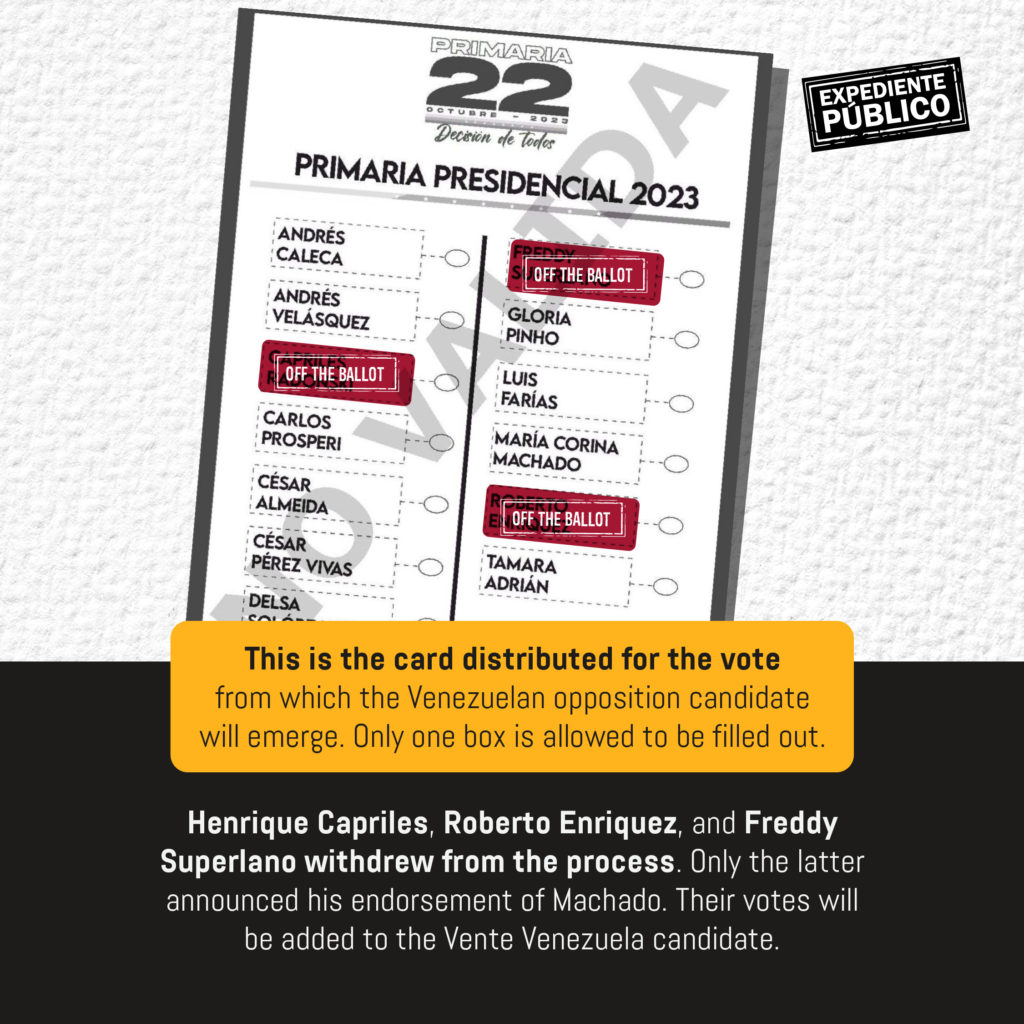
Primaries in Venezuela with conditions
The conditions are to enable the use of public facilities as voting centers, police and military surveillance of the event, protect the identities of voters, allow participation by international observers, and issue credentials to foreign journalists.
This information, provided to Expediente Público by a senior member of the CNP who asked for his identity not to be disclosed, was in itself an encouraging sign that the opposition primary would take place.
Five days later, another member of the commission, Roberto Abdul, expressed the same certainty during a presentation organized for the academic sector, diplomats, and independent journalists.
“Our perception is that the pressures on the process have decreased,” he stated.
But Casal’s group rejected the official proposal. By that time, it had already been decided that the primary would be carried out by the method they themselves termed “self-managed;” that is, with their own resources.
Accepting Amoroso’s suggestion would have meant postponing the primary, which would have provided ammunition to critics of the process.
See: Chavismo handed Venezuela over to the Chinese, with catastrophic results
Negotiations from Doha to Barbados
The leaders of the CNP were aware of the direct negotiations taking place between the Maduro regime, represented by siblings Jorge and Delcy Rodríguez, and the US government, represented by a team headed by the Assistant Secretary of State for Western Hemisphere Affairs, Brian Nichols.
The setting for this dialogue was Doha, the capital of Qatar, an opulent state in the Persian Gulf that incidentally does not have an extradition treaty with the United States.
At that time the CNP already knew that Joe Biden’s administration was willing to ease certain sanctions that had been in place since 2018. These sanctions were implemented by the Treasury Department to choke off the flow of resources that fueled official corruption in order to straighten out Maduro’s course; to steer him back towards the “democratic channel.”
Maduro’s promise and the US
According to Benigno Alarcón, director of the Center for Political and Government Studies at the Andrés Bello Catholic University, it was in Doha where the agreement between the Maduro regime and the opposition was hashed out.
However, it would not be signed there but in Barbados on October 17.
In a conversation with Expediente Público, Alarcón noted that the US paid a high price to make sure that the primary would be allowed. As he sees it, Maduro made only a few minor concessions, apart from the primary itself. For example, it was formally agreed that the next presidential election will take place “in the latter half of 2024″.
See: Nicolás Maduro tries to salvage Chinese confidence
To Alarcón, it couldn’t have gone any other way; “It would be a very bad time for the government to go into an election before then,” he summarized.
It is therefore in Maduro’s best interest to let as much time pass as possible, to see if he can recover his depleted finances and run what he has described as “a clientelistic campaign,” similar to those undertaken by his predecessor Hugo Chávez between 2004 and 2012.
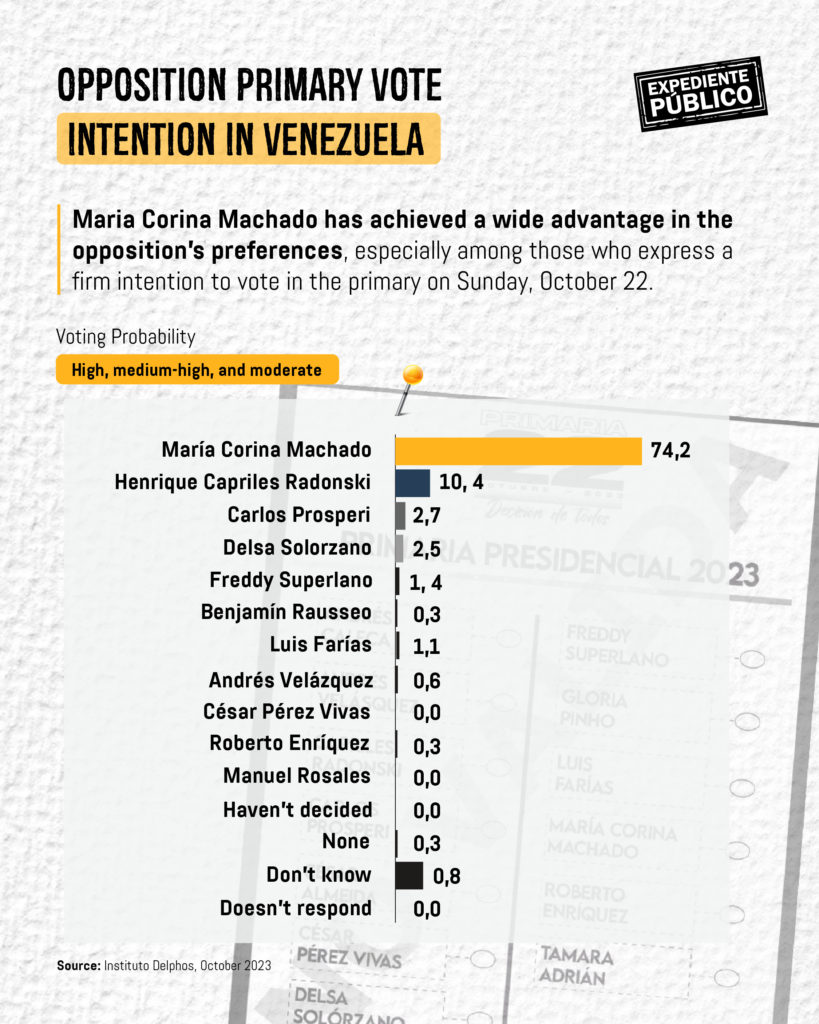
Primaries this October 22
During his presentation, Abdul stated that the primary will have 5,134 voting stations located in 3,070 centers.
Another 838 voting places will collect the votes of the diaspora in 77 cities around the world. There were 80 cities initially, but Tel Aviv and the two in Argentina were dropped.
He indicated that these facilities plus the material supplied to the centers will enable 3.1 million people to vote.
Although the voting procedure is entirely manual, it is designed to take no more than one minute, counted from the moment a person presents their ID document until their ballot is put into the ballot box.
The favorite candidate
Since early 2023, voter preferences have leaned in favor of María Corina Machado, a 56-year-old engineer who entered politics in the 2000s with the support of the election observer NGO Súmate. She is now the leading exponent of the Vente Venezuela group.
A poll held three weeks before the primary by the Delphos Institute has found that Machado has more than 74% of the voting intention among those who definitely plan to vote in the October 22 elections.
At the time the poll was carried out, Henrique Capriles (Primero Justicia), Freddy Superlano (Voluntad Popular) and Roberto Enríquez (Copei originario) were still in the running.
Delphos director Félix Séijas told Expediente Público that after the withdrawal of these three candidates, the configuration of voter preferences “remains practically intact.”
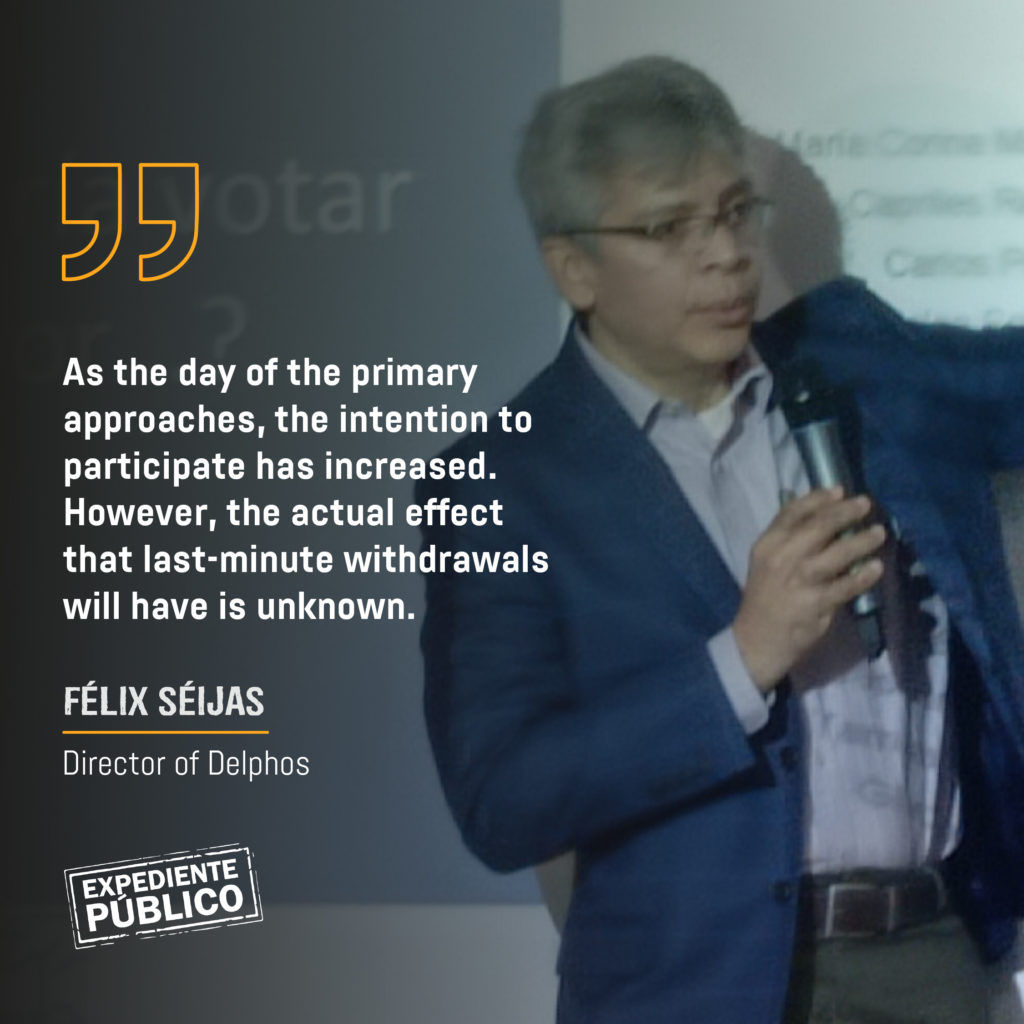
How many will vote in the primaries?
Séijas estimated that at least 1.8 million people will vote. The projected maximum will be around 2.8 million. This includes those who are part of the diaspora and were able to update their data in the Electoral Registry.
To Séijas, any number of votes in this range could be considered a success by the organizers, considering that Venezuela is immersed in a complex ongoing humanitarian emergency, which even restricts people’s mobility due to fuel shortages.
Despite her favorable position in the polls – or perhaps because of it – María Corina Machado is blocked from running for the top position in Venezuela.
The opposition regroups
In July, the Comptroller General of the Republic unexpectedly took away that right. At the time, the agency was chaired by Elvis Huidobro Amoroso, the same person who was later sent by the ruling party to lead the National Election Commission.
At least three appeals to revoke this decision have been filed before the Supreme Court of Justice. But the leadership of the Judiciary, dominated by the ruling party, has continued to ratify it. They even went so far as to declare that it was “inadmissible” to review this measure.
Alarcón foresees that this situation could generate a contradiction: a winner in the primary who cannot be a candidate, and who would have to be recognized as the new leader of the forces opposing the ruling party.
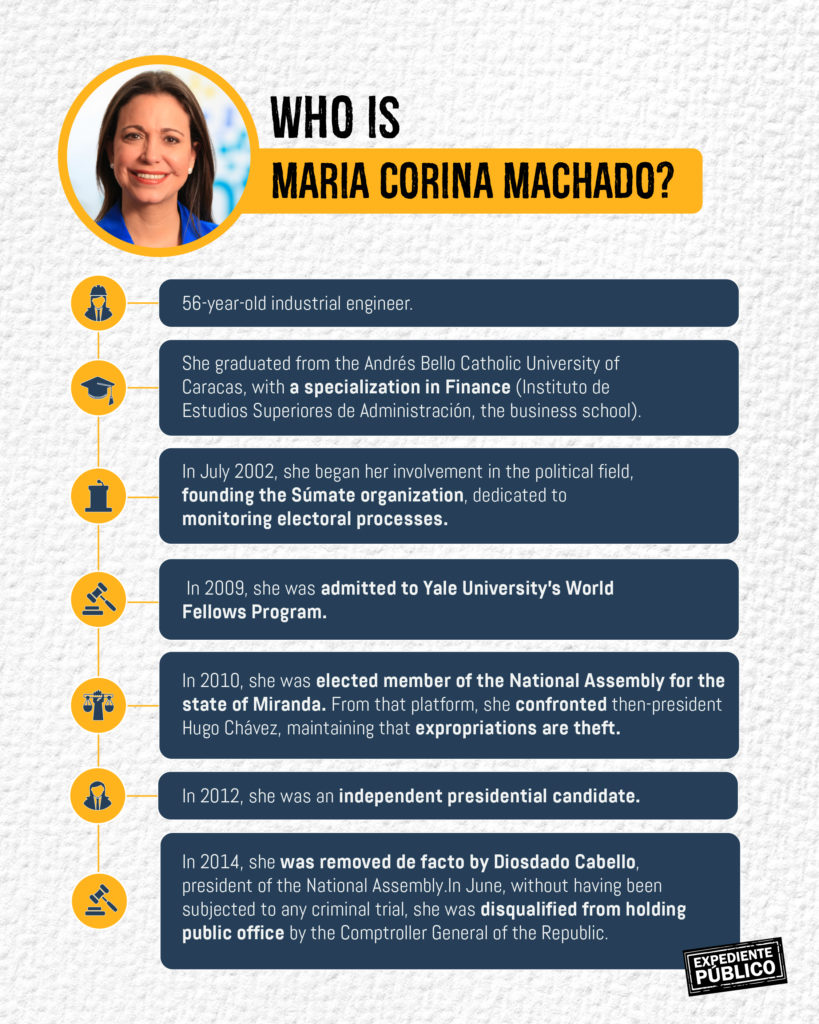
Will Nicolás Maduro comply?
A contradictory scenario would unfold within the opposition. This would become more evident following November 30, the expiry of the deadline set by the US to resolve the disqualifications.
“For now, there will be a hiatus until November. She (Machado) could hold onto the role of ‘the prime elector.’ It will not be perfect, but she would retain it for having won the primary,” political consultant Oswaldo Ramírez Colina told Expediente Público.
According to Ramírez Colina, Roberto Enríquez’s resignation and especially that of Henrique Capriles are a sign that following the primary, their respective political groups could in some way put Machado’s role as the main opposition leader into doubt.
Acción Democrática – whose candidate Carlos Prosperi remains in the running – could take the same line.
And in the background hovers the need to designate a potential replacement candidate if the disqualification hurdle is not resolved.
According to the director of Delphos, a majority of the opposition has indicated that this replacement should be “whomever María Corina decides on.” Hence her potential role as the prime elector. But this has not yet been decided.


